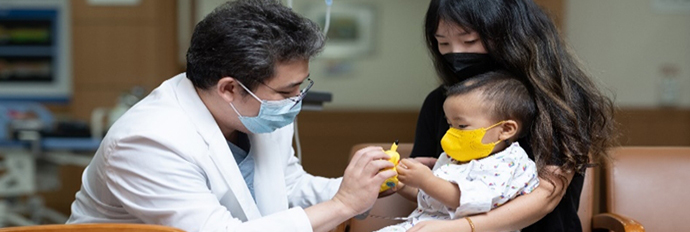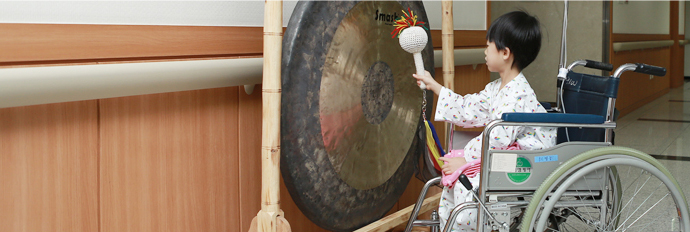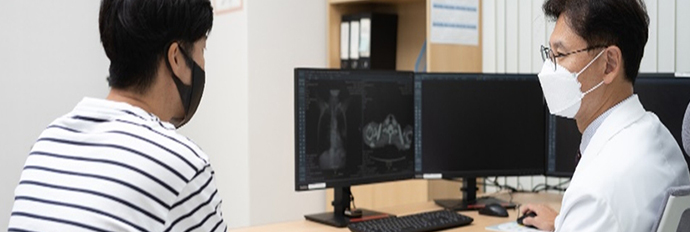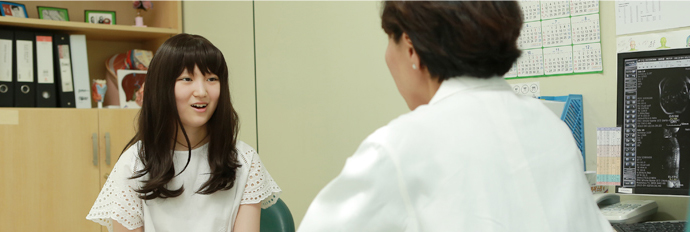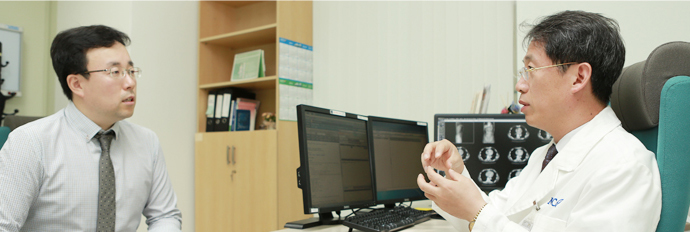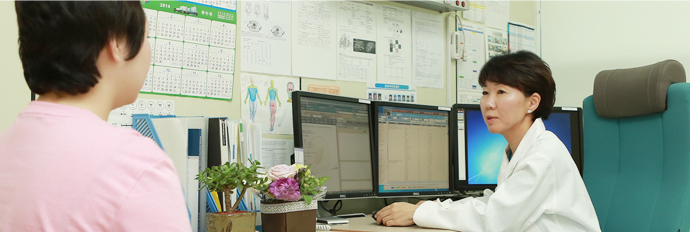Side effects manage
- Home
- Proton Therapy Center
- Patients resources
- Proton therapy itself is painless. Patients who are treated with proton therapy also experience fewer side effects than patients treated with conventional radiotherapy. However, patients may experience side effects such as hair loss, mouth changes, skin changes, throat changes, diarrhea, urinary and bladder changes, and nausea/vomiting.
Skin changes
- Skin changes can happen on any part of the body exposed to radiation. Skin changes may start a few weeks after starting radiation therapy. Many skin changes disappear within a few weeks of completing treatment. Your treated skin may look darker and blotchy. It may also feel dry or thicker than before treatment. The treated skin may also burn quickly and be more sensitive to the sun.
Ways to manage skin changes
- Be gentle and do not rub, scrub, or scratch the treated area.
- Use the creams prescribed by your doctor.
- When taking a shower or bath, use a mild soap that does not have any fragrance or deodorant.
- Dry yourself with a soft towel by patting, not rubbing, your skin. Be careful not to wash off the ink marks that are needed for radiotherapy.
- Wear clothes and use bed sheets that are soft, such as those made from cotton.
- Do not wear clothes that are tight and do not breathe, such as girdles and pantyhose.
- Protect your skin from the sun every day. Wear a broad-brimmed hat, long-sleeved shirt, and long pants when you are outside.
- Ask your doctor or nurse if you can shave the treated area. If you can shave, use an electric razor and do not use pre-shave lotion
- If radiotherapy is applied to the rectal area, you are likely to have skin problems. Clean yourself with a baby wipe or a squirt of water from a spray bottle. Ask your nurse about sitz baths (a warm-water bath taken in a sitting position that covers only the hips and buttocks.)
Hair loss
- Hair loss during radiotherapy only occurs at the part of your body being treated, unlike chemotherapy, which can cause hair loss all over your body. For example, you may lose some or all of the hair on your head following radiotherapy to your brain. After radiotherapy of your hip, you may lose pubic hair but not hair on your head. You may start losing hair in the treated area 2-3 weeks after your first radiation therapy session. Your hair may grow back 3-6 months after completing treatment. Once your hair starts to grow back, it may not look or feel the way it did before.
Ways to manage hair loss on your head
Before hair loss
- Be gentle when you wash your hair.
- Do not use curling irons, electric hair dryers, curlers, hair bands, clips, or hair sprays.
- Do not use products that are harsh on your hair, such as hair colors, perms, gels, mousse, oil, grease, or pomade.
After hair loss
- Protect your scalp. Your scalp may feel tender after hair loss.
- Cover your head with a hat, turban, or scarf when you are outside.
- Try not to avoid very cold or very hot environments by staying away from the direct sun, sun lamps, or very cold air.
- Because your hair helps keep you warm, you may feel colder once you lose it. You can stay warmer by wearing a hat, turban, scarf, or wig.
Nausea and vomiting
- Nausea and vomiting can occur after radiotherapy of the stomach, small intestine, colon, or parts of the brain. The risk of nausea and vomiting depends on the radiation dose, how much of your body is in the treatment area, and whether you are also having chemotherapy. Nausea and vomiting may occur from 30 minutes to many hours after each radiotherapy session. You are likely to feel better on the days that you do not have radiotherapy
Ways to manage nausea and vomiting
- Consume bland, easy-to-digest foods and drinks that do not upset your stomach.
- You may feel less nausea if you relax before each radiation therapy treatment. You can do this by spending time doing activities you enjoy, such as reading a book, listening to music, or other hobbies.
- Learn the best time for you to eat and drink.
- You might want a snack of crackers and apple juice 1-2 hours before each session
- You might feel better if you are treated on an empty stomach, which means not eating 2-3 hours before treatment
- Eat small meals and snacks.
- Your physician may recommend a special diet or prescribe drugs that can help to prevent nausea, which you should take 1 hour before each treatment session.
Hair loss
- Hair loss during radiotherapy only occurs at the part of your body being treated, unlike chemotherapy, which can cause hair loss all over your body. For example, you may lose some or all of the hair on your head following radiotherapy to your brain. After radiotherapy of your hip, you may lose pubic hair but not hair on your head. You may start losing hair in the treated area 2-3 weeks after your first radiation therapy session. Your hair may grow back 3-6 months after completing treatment. Once your hair starts to grow back, it may not look or feel the way it did before.
Ways to manage hair loss on your head
Before hair loss
- Be gentle when you wash your hair.
- Do not use curling irons, electric hair dryers, curlers, hair bands, clips, or hair sprays.
- Do not use products that are harsh on your hair, such as hair colors, perms, gels, mousse, oil, grease, or pomade.
After hair loss
- Protect your scalp. Your scalp may feel tender after hair loss.
- Cover your head with a hat, turban, or scarf when you are outside.
- Try not to avoid very cold or very hot environments by staying away from the direct sun, sun lamps, or very cold air.
- Because your hair helps keep you warm, you may feel colder once you lose it. You can stay warmer by wearing a hat, turban, scarf, or wig.
Mouth changes
- Radiotherapy kills cancer cells and can damage healthy cells, including cells in the glands that make saliva and the soft, moist lining of your mouth. Some problems, like mouth sores, may go away 2-3 weeks after completing radiotherapy. However, others, such as taste changes, may last for several months or years. Some problems, like dry mouth, may never go away.
Mouth changes include
- Mouth sores (small cuts or ulcers in your mouth).
- Dry mouth (also called xerostomia) and throat.
- Loss of taste.
- Tooth decay.
- Changes in taste (such as a metallic taste when you eat meat).
- Infections of your gums, teeth, or tongue.
- Jaw stiffness and bone changes.
- Thick, rope-like saliva.
Ways to manage mouth changes
- Visit a dentist at least 2 weeks before starting radiotherapy of your head or neck.
- Check your mouth every day. You may see or feel problems as soon as they start. Problems can include mouth sores, white patches, or infection.
- Keep your mouth moist. You can do this by:
- Regularly sipping water during the day
- Sucking on ice chips
- Chewing sugar-free gum or sucking on sugar-free hard candy
- Using a saliva substitute to help moisten your mouth
- Asking your doctor to prescribe a drug that increases saliva production
- Keep your mouth, teeth, gums, and tongue clean.
- Brush your teeth, gums, and tongue after every meal and at bedtime using an extra-soft toothbrush
- Use a fluoride toothpaste
- Do not use mouthwashes that contain alcohol
- Rinse your mouth at bedtime with a solution containing 1/4 of a teaspoon of baking soda and 1/8 of a teaspoon of salt mixed in 1 cup of warm water
- Keep your dentures clean by brushing them each day
Throat changes
- Radiation therapy to the neck or chest can cause the lining of your throat to become inflamed and sore. This is called esophagitis. You may feel as if you have a lump in your throat or burning in your chest or throat. You may also have trouble swallowing.
Radiotherapy of the neck or chest can cause throat changes because it kills cancer cells and may damage healthy cells lining your throat. Your risk of throat changes depends on the radiation dose, whether you are also receiving chemotherapy, and whether you use tobacco and alcohol during treatment. You may notice throat changes within 2-3 weeks after starting radiotherapy. The symptoms usually start to improve within 4-6 weeks of completing the treatment.
Ways to manage throat changes
- Choose foods that are easy to swallow.
- Cut, blend, or shred foods to make them easier to eat.
- Eat moist, soft foods such as cooked cereals, mashed potatoes, and scrambled eggs.
- Wet and soften food with gravy, sauce, broth, yogurt, or other liquids.
- Eat foods that are cool or at room temperature.
- Eat small meals and snacks.
- Remain sitting or standing upright for at least 30 minutes after eating.
- Sip drinks through a straw.
- Do not consume foods/drinks that can burn or scrape your throat.
- Talk to your doctor or nurse. Your doctor can prescribe drugs that may help relieve your symptoms, such as antacids, gels that coat your throat, and painkillers.
Skin changes
- Skin changes can happen on any part of the body exposed to radiation. Skin changes may start a few weeks after starting radiation therapy. Many skin changes disappear within a few weeks of completing treatment. Your treated skin may look darker and blotchy. It may also feel dry or thicker than before treatment. The treated skin may also burn quickly and be more sensitive to the sun.
Ways to manage skin changes
- Be gentle and do not rub, scrub, or scratch the treated area.
- Use the creams prescribed by your doctor.
- When taking a shower or bath, use a mild soap that does not have any fragrance or deodorant.
- Dry yourself with a soft towel by patting, not rubbing, your skin. Be careful not to wash off the ink marks that are needed for radiotherapy.
- Wear clothes and use bed sheets that are soft, such as those made from cotton.
- Do not wear clothes that are tight and do not breathe, such as girdles and pantyhose.
- Protect your skin from the sun every day. Wear a broad-brimmed hat, long-sleeved shirt, and long pants when you are outside.
- Ask your doctor or nurse if you can shave the treated area. If you can shave, use an electric razor and do not use pre-shave lotion
- If radiotherapy is applied to the rectal area, you are likely to have skin problems. Clean yourself with a baby wipe or a squirt of water from a spray bottle. Ask your nurse about sitz baths (a warm-water bath taken in a sitting position that covers only the hips and buttocks.)
Throat changes
- Radiation therapy to the neck or chest can cause the lining of your throat to become inflamed and sore. This is called esophagitis. You may feel as if you have a lump in your throat or burning in your chest or throat. You may also have trouble swallowing.
Radiotherapy of the neck or chest can cause throat changes because it kills cancer cells and may damage healthy cells lining your throat. Your risk of throat changes depends on the radiation dose, whether you are also receiving chemotherapy, and whether you use tobacco and alcohol during treatment. You may notice throat changes within 2-3 weeks after starting radiotherapy. The symptoms usually start to improve within 4-6 weeks of completing the treatment.
Ways to manage throat changes
- Choose foods that are easy to swallow.
- Cut, blend, or shred foods to make them easier to eat.
- Eat moist, soft foods such as cooked cereals, mashed potatoes, and scrambled eggs.
- Wet and soften food with gravy, sauce, broth, yogurt, or other liquids.
- Eat foods that are cool or at room temperature.
- Eat small meals and snacks.
- Remain sitting or standing upright for at least 30 minutes after eating.
- Sip drinks through a straw.
- Do not consume foods/drinks that can burn or scrape your throat.
- Talk to your doctor or nurse. Your doctor can prescribe drugs that may help relieve your symptoms, such as antacids, gels that coat your throat, and painkillers.
Diarrhea
- Radiotherapy of the pelvis, stomach, or abdomen can cause diarrhea. People get diarrhea because the radiation harms the healthy cells in the large or small bowel. These areas are very sensitive to the amount of radiation needed to treat cancer.
Ways to manage diarrhea
- Drink 8-12 cups of clear liquid per day.
- Eat smaller meals and snacks. For example, eat 5 or 6 small meals and snacks rather than 3 large meals.
- Eat foods that are easy on the stomach, particularly foods that are low in fiber, fat, and lactose.
- Avoid:
- Milk and dairy foods, such as ice cream, sour cream, and cheese
- Spicy foods, such as hot sauce, salsa, chili, and curry dishes
- Foods or drinks containing caffeine, such as regular coffee, black tea, soda, and chocolate
- Foods or drinks that cause gas, such as cooked dried beans, cabbage, broccoli, soy milk, and other soy products
- Foods that are high in fiber, such as raw fruits and vegetables, cooked dried beans, and whole wheat breads and cereals
- Take care of your rectal area:
- Instead of toilet paper, use a baby wipe or a squirt of water from a spray bottle to clean yourself after bowel movements
- Ask your nurse about taking sitz baths, which is a warm-water bath taken in a sitting position that covers only the hips and buttocks
- Tell your doctor or nurse if your rectal area is sore
Nausea and vomiting
- Nausea and vomiting can occur after radiotherapy of the stomach, small intestine, colon, or parts of the brain. The risk of nausea and vomiting depends on the radiation dose, how much of your body is in the treatment area, and whether you are also having chemotherapy. Nausea and vomiting may occur from 30 minutes to many hours after each radiotherapy session. You are likely to feel better on the days that you do not have radiotherapy
Ways to manage nausea and vomiting
- Consume bland, easy-to-digest foods and drinks that do not upset your stomach.
- You may feel less nausea if you relax before each radiation therapy treatment. You can do this by spending time doing activities you enjoy, such as reading a book, listening to music, or other hobbies.
- Learn the best time for you to eat and drink.
- You might want a snack of crackers and apple juice 1-2 hours before each session
- You might feel better if you are treated on an empty stomach, which means not eating 2-3 hours before treatment
- Eat small meals and snacks.
- Your physician may recommend a special diet or prescribe drugs that can help to prevent nausea, which you should take 1 hour before each treatment session.
Diarrhea
- Radiotherapy of the pelvis, stomach, or abdomen can cause diarrhea. People get diarrhea because the radiation harms the healthy cells in the large or small bowel. These areas are very sensitive to the amount of radiation needed to treat cancer.
Ways to manage diarrhea
- Drink 8-12 cups of clear liquid per day.
- Eat smaller meals and snacks. For example, eat 5 or 6 small meals and snacks rather than 3 large meals.
- Eat foods that are easy on the stomach, particularly foods that are low in fiber, fat, and lactose.
- Avoid:
- Milk and dairy foods, such as ice cream, sour cream, and cheese
- Spicy foods, such as hot sauce, salsa, chili, and curry dishes
- Foods or drinks containing caffeine, such as regular coffee, black tea, soda, and chocolate
- Foods or drinks that cause gas, such as cooked dried beans, cabbage, broccoli, soy milk, and other soy products
- Foods that are high in fiber, such as raw fruits and vegetables, cooked dried beans, and whole wheat breads and cereals
- Take care of your rectal area:
- Instead of toilet paper, use a baby wipe or a squirt of water from a spray bottle to clean yourself after bowel movements
- Ask your nurse about taking sitz baths, which is a warm-water bath taken in a sitting position that covers only the hips and buttocks
- Tell your doctor or nurse if your rectal area is sore
Urinary and bladder changes
- Urinary and bladder problems may occur after radiotherapy of the prostate or bladder. Radiotherapy can harm healthy cells in the bladder wall or urinary tract, which can cause inflammation, ulcers, and infection.
Urinary and bladder changes include
- Burning or pain when you begin to urinate or after you empty your bladder.
- Trouble starting to urinate.
- Trouble emptying your bladder.
- Frequent, urgent need to urinate.
- Cystitis, a swelling (inflammation) in your urinary tract.
- Incontinence, or limited control of the flow of urine from your bladder, especially when coughing or sneezing.
- Frequent need to get up during sleep to urinate.
- Blood in your urine.
- Bladder spasms, which are like painful muscle cramps.
Ways to manage urinary and bladder changes
- Drink lots of fluids.
- This means 6-8 cups of fluid per day
- Drink enough fluid to ensure your urine remains clear or is light yellow in color.
- Avoid coffee, black tea, alcohol, spices, and all tobacco products.
- Talk to your doctor or nurse if you think you have urinary or bladder problems. He or she may ask for a urine sample to make sure that you do not have an infection.
- Your doctor may prescribe antibiotics if your problems are caused by an infection.
- Your doctor may also prescribe drugs that can help you to urinate, reduce burning or pain, and ease bladder spasms.
Nausea and vomiting
- Nausea and vomiting can occur after radiotherapy of the stomach, small intestine, colon, or parts of the brain. The risk of nausea and vomiting depends on the radiation dose, how much of your body is in the treatment area, and whether you are also having chemotherapy. Nausea and vomiting may occur from 30 minutes to many hours after each radiotherapy session. You are likely to feel better on the days that you do not have radiotherapy
Ways to manage nausea and vomiting
- Consume bland, easy-to-digest foods and drinks that do not upset your stomach.
- You may feel less nausea if you relax before each radiation therapy treatment. You can do this by spending time doing activities you enjoy, such as reading a book, listening to music, or other hobbies.
- Learn the best time for you to eat and drink.
- You might want a snack of crackers and apple juice 1-2 hours before each session
- You might feel better if you are treated on an empty stomach, which means not eating 2-3 hours before treatment
- Eat small meals and snacks.
- Your physician may recommend a special diet or prescribe drugs that can help to prevent nausea, which you should take 1 hour before each treatment session.








